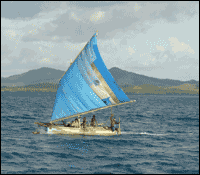What do we refer to when we use the word Lapita?
Lapita is the name given a distinctive suite of artefacts, including pottery, shell and polished stone tools, as well as domesticated animals and plants [pdf]. It gained its name from a decorated pottery style which was first found at a site of that name on New Caledonia. Excavationson, for example Fiji and Tonga, have established a sequence of settlements from the Bismarck archipelago through the western Pacific after 3500BP (see map and table below). 1000 years later settlements with these artefacts ceased to exist.
But there are many unanswered questions and problems with describing this group of settlements as one culture, some of which this project will address.
The pottery style that gave the culture its name is the most
distinctive factor which connects the sites, but
another factor, the type of
sea-going vessel (Anderson ¶2)
used by the people, was also closely
associated with the movement of the culture. Prior to this, the
islanders of the Bismarck archipelago probably relied on rafts and
dugout canoes to sail to islands that were always in sight of land
(Irwin 1991). The Lapita are associated with the first use of sail
and the
outrigger canoe [pdf], which enabled them to travel past the close
islands of the
Bismarck archipelago to settle in the western Pacific.
|
|

